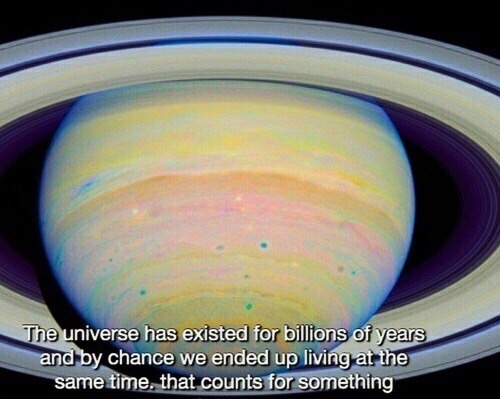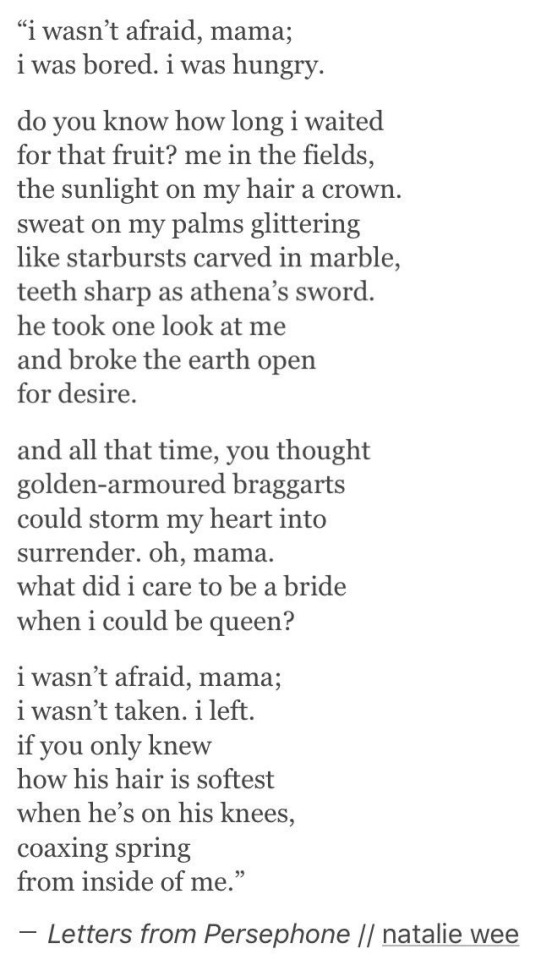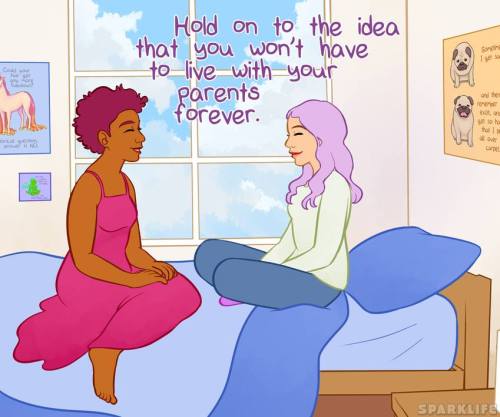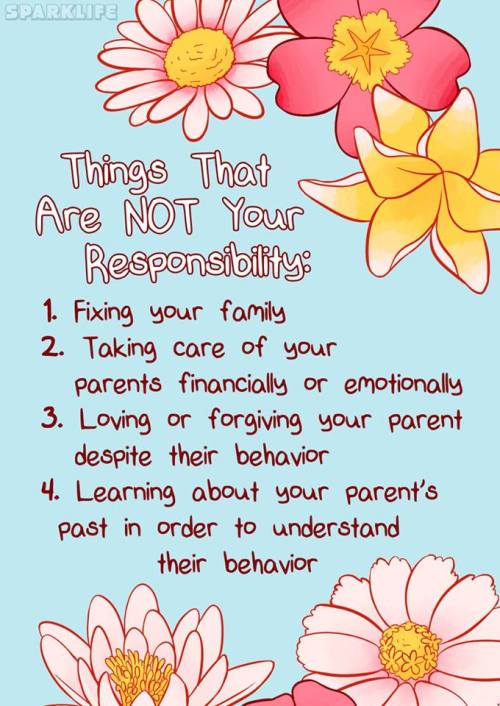86 posts
Latest Posts by lottie360 - Page 2

the art of saying no was a numbing in our mouths. we learned how to form it gently, to swallow the punch, to let down with gentlest hands. we learned how to fake a smile, to force a chuckle, to take disgust and turn it into polite denial, to take fear and weigh our options and submit. he said he needed sex because oh it hurt how we made him. he said we should have just smiled back at him. he said that we could have learned karate to fight them. he said that we couldn’t say no, he was our boyfriend.
how many girls are raised to feel guilty for no. we feel it must come with a reason. our no has to have qualifications. if our no isn’t enough, we are expected to cave in.
the battle of our inner strength and our outer bodies. how we calculate small injustice versus our personal safety. how we’d form no in small ways that made him feel like it was our fault. how we’d let him down in a way he wouldn’t follow us home. we’d say no without the words; lying about sudden appointments or phone calls, we’d invent husbands, we’d suddenly become best friends with the woman beside us. we always had someone waiting at home for us - usually big and angry - who would notice if we were missing. we enter in our phone numbers with the last two digits switched. we say we’re going to the bathroom we’ll be right back before we take off running.
and our no, those two letters, was never good enough. we either rejected him too harshly or not clearly. if we said no, we weren’t in love. the no was too forceful, the no was too gentle. the no meant ask nicely, the no meant keep persisting. the no was because we’re all catty and cruel and hate nice men. the no was because we’re all paranoid bitches. the no was wait long enough and it’s a yes. the no was playing hard to get.
and our life was learning. it amazes me sometimes when men tell me, “but she never said no” and i hear her story. how he was her boss and she would lose her job and it was her everything. how he said no but men aren’t allowed to refuse these things. i was thirteen the first time i had to spend a two hour train ride gently turning down a middle-aged man and someone else told me i should have just screamed or hit him or done something. how the girls i told all nodded solemnly because they know what it’s like to be thirteen and scared and to be eighteen and scared and how to be twenty-three and scared. because we’ve all said no and had it blow up in our faces. we’ve watched men turn from flirty to aggressive. we’ve seen what happens to our friends.
but in the end it’s our fault. don’t you know a man can’t take rejection.
In that great discourse with the living dead which we call reading, our role is not a passive one. […] We engage the presence, the voice of the book. We allow it entry, though not unguarded, into our inmost. A great poem, a classic novel, press in upon us; they assail and occupy the strong places of our consciousness. They exercise upon our imagination and desires, upon our ambitions and most cover dreams, a strange, bruising mastery. Men who burn books know what they are doing. The artist is the uncontrollable force; no western eye, since Van Gogh, looks on a cypress without observing in it the start of a flame. So, and in supreme measure, it is with literature. A man who has read Book XXIV of the Iliad - the night meeting of Priam and Achielles - or the chapter in which Alyosha Karamazov kneels to the stars, who has raid Montaigne’s chapter XX (Que philosopher c'est apprendre à mourir) and Hamlet’s use of it - and who is not altered, whose apprehension of his own life is unchanged, who does not, in some subtle yet radical manner, look on the room in which he moves, on those that knock at the door, differently - has read only with the blindness of physical sight. […] To read well is to take great risks. It is to make vulernable our identity, our self possession. In the early stages of epilepsy there occurs a characteristic dream (Dostoyevsky tells of it). One is somehow lifted free of one’s own body; looking backbone sees oneself and feels a sudden, maddening fear; another presence is entering one’s own person, and there is no avenue of return. Feeling this fear, the mind gropes to a sharp awakening. So it should be when we take in hand a major work of literature or philosophy, of imagination or doctrine. It may come to possess us so completely that we go, for a spell, in fear of ourselves and in imperfect recognition. He who has read Kafka’s Metamorphosis and can look into his mirror unflinching may technically be able to read print, but is illiterate in the only sense that matters.
George Steiner, “Humane Literacy” from Language and Silence (via mesogeios)
There’s a graveyard inside my mouth because I buried all these words before they had a chance to leave my lips, and I promise I’ve tried to dig them out, but they’ve turned into skeletons that can’t make a sound.
Alexa Evangelista, the book i’ll never finish writing (via vodkakilledtheteen)

via weheartit
I was on a walk when I saw Death at a street corner. I didn’t like him so I just power-walked right past him. He got flustered and hurried after me while trying to talk to me, but I kept ignoring him.

Immortality
Immortality. Tell me, is it worth it?
Is it worth it, proud Hera of marriage, to watch divorce become the norm, to watch marriage become a farce?
Is it worth it, lovely Aphrodite of love, to watch people fall in fake love, to watch the mortals police what kind is allowed?
Is it worth it, brilliant Athena of wisdom, to watch them misuse your gift, to use their minds to hurt others?
Is it worth it, mystic Persephone, to watch your flowers wither in the too hot spring sun, to watch more and more souls collect on the bank of Styx?
Is it worth it, pure Hestia, to watch families become chaotic, to watch more and more mortals living without a home?
Is it worth it, wild Artemis, to watch your forests be reduced to twigs, to watch the creatures you so sacredly pursue become endangered?
Is it worth it, mother of nature Demeter, to watch the earth suffer, to watch it bleed sickness and pollution?
Is it worth it, powerful Hecate, to watch the mortals forget about the magic in everything, to watch the little witch in young girls’ eyes burn out sooner and sooner?
Is it worth it, you pitiful mortals, to be forsaken and forgotten just as you forsake and forget?
Immortality. Was it worth it?
–Selcouth-Saudade
The gods have always been there. Apollo pops down to say hello and gloat and flirt with some random mortal. Athena comes down to chat and argue with the scholars and those too poor to get into school but still smart enough to rig running water to their houses. Persephone will make your garden overflow with crops and flowers if you leave a dog bone for Cerberus on your doorstep. Dionysus makes fun of the European Jesus and turns teenagers water to wine if you plant grape vines outside your window and leave water on the windowsill. Artemis will come down and hunt, looking for excuses to fight and grapple. If you leave out a peacock corsage for Hera the day before your wedding she’ll bless it and Hestia will provide your feast.
The gods have always been there, but they have not always been kind.
Women cut their hair jagged and run their eyeliner so that Zeus won’t find them attractive. People have to throw offerings into the sea before entering and women don’t wear revealing outfits for fear of attracting Poseidon’s attention. Hera will send Artemis to kill any man who she thinks is unsuited for his wife. Apollo can’t stand a one night fling.
The gods have always been there, but they have not always been kind.
i danced with dionysus with wine-misted eyes and skin sticky with glitter.
i kissed hermes behind a 7/11 in a country whose name I don’t remember.
i caught hekate’s eye in the misty glint of the scrying crystal i hide from my roomate.
apollo touched my hand in the midst of a concert, deaf and blind and wide awake.
i winked at aphrodite as she twirled across the room, lips painted pink and confetti in her hair.
the gods are dead but their shadows wander through us.
lock eyes with a mortal and they’ll find you.

perhaps the goddesses of old still live
i. perhaps artemis can be found in the wild girls. perhaps she is in the woman who brings signs and banners to protests, the woman who guards the wildlife that is left. perhaps in the protected forests, perhaps in the girls who tie themselves to the thousand year old sycamores, perhaps in their chains.
ii. perhaps hestia can be found in the woman who runs the homeless shelter for women. perhaps in her wrinkled hands which knead dough over and over again to feed those without. perhaps in her eyes, which age every time another girl comes in with a hijab torn off, or her skin bruised, or her home taken from her.
iii. perhaps athena can be found in the women who invent a new world. in the way that their computers blink as they find ways to reshape the universe. perhaps in the stars, which they will be the first to fine. perhaps in the professor of science, the woman who taught her children to be smarter than her. perhaps in the books which she writes, or the podium which she carves for herself.
iv. perhaps demeter can be found in the gardens which the caretaker in the retired community tends to. perhaps in the soil and the seeds and the stems and the little green sprout. perhaps she can be found in the girls who tend to fields of daisies, or in the girls who tend to fields of corn. perhaps in the songs the earth sings, or in the girls who still know the language.
One of my favorite stories about Artemis is that after she required Agamemnon to sacrifice his daughter Iphigenia, she stole her away at the last moment and left a white deer in her place. After that, people disagree on what happened, but I like the story where Artemis transforms her into Hecate, because can you imagine them in the modern era?
Artemis, protector of young women and goddess of the hunt turned vigilante, hunting down the ones who attack girls in dark alleys, the ones with beer-hard hands and no sense of decency even if they’d been sober anyway.
But when Artemis finds the girls, she takes them to Hecate–Hecate, who was mortal once, led like a lamb to an altar by a man who was supposed to protect her. And sure, Artemis is the one who makes them pay, who delights in their screams and dances in the moonlight once she knows those men will be scared of the dark forever, spend their entire lives looking over their shoulders fearing her.
But Hecate… Hecate is good with herbs and potions and she understands the nightmares, the heart-pounding, sweaty hands panic that wakes them up screaming in the middle of the night, and she makes them herbal draughts to help them sleep, because unlike Artemis, Hecate understands. She isn’t vengeful, an angry older sister out for blood like Artemis. She’s the best friend, the mother, and the sister rolled all into one.
So Artemis avenges them and Hecate cares for them and the moon-goddess Selene shines her absolute brightest for them, fills every shadow with bright silver so they don’t need to be afraid of the dark anymore, and the three goddesses call these their Lost Girls, and at first Apollo was sort of skeptical but there’s no stopping Artemis when she sets her mind on something, and before Apollo quite realizes it, he’s running beside his sister, chasing a boy who couldn’t keep his hands to himself, and he’s never felt more right.
“so maybe this bridge was always meant to burn / maybe we were handing the matches back and forth back and forth / waiting for someone to strike out / waiting for someone to say / okay this is enough / I need to see some light / I need to see some flames / let’s set this ablaze and not call the police / let’s close our eyes and run opposite ways / I think I need to get away from you for awhile / I think I need to make sure I can never come home to you again.”
— where did the fire go / it never kept us warm– lily rain
In some versions of the story it wasn’t the sun that Icarus flew too close to- it was the ocean with it’s tantalizing blue depths and salt water that stripped his wings of glue and down down down he fell sinking into the waves no one ever taught him how to swim. in some versions of the story Persephone walked into the underworld with her head held high eyes forward ready to take and take and take she stole the pomegranate seeds and when Hades found out he was furious and sent her away but every six months the seeds brought her back to the gate and a crown made of thorns grew on top of her head and she was queen. in some versions of the story Artemis fell in love with a mortal and when he broke her heart she grew cold and unfeeling not even her brother could pull her from her darkness there are days when she still finds herself at the windowsill waiting waiting waiting for her lover to return knowing he’s with another. in some versions of the story Medusa grew lonely she lived in a garden of statues and no one came to visit anymore and all she wanted was someone to love she became angrier and angrier at the cursed serpents on her head until one day she grabbed gardening shears and one by one by one chopped off the heads of the snakes but with their life force went hers and they bled out together and with a knowing look in her eyes she faded away. in some versions of the story the Gods and monsters and legends are still among us in churches and diners and battlefields they sit hunched over on dirty porch steps with cigarettes in their hands or across from you as a dinner date they have become us in more ways than one in some versions of the story the myths never faded from our minds because they are still in front of our eyes and you are the main character you are the reason we are all still here.
You’ll never know how much you mean to the stars– Lily Rain (via wont-time-love-us)
Don’t you dare pity her She traded a suffering soul for a throne of bones She exchanged watchful eyes for a court of her own The seasons of the earth depended on the very breath she took She had death wrapped around her fingers and spring at her beck and call and the ruler of the heavens tasked with finding her She turned the world upside down to find freedom The daughter of flowers escaped her prison made out of roots and thorns and became the queen of death and forged her new home out of shadows and power
Persephone was the real winner (via starlightpoet)
Hades ascended in his war chariot to confront her, wreathed in shadows and flame, pulled by dark horses. The dryads of the poplar and willow trees fled before him, and the grasses shriveled to ash under obsidian hooves. “BRIGHT LADY. I OFFER A THRONE. A KINGDOM. A CROWN. DESCEND WITH ME. RULE OVER THE HALLS OF THE DEAD” His voice echoed with centuries of stone, his eyes bright with black flames. Persephone eyed the tall and terrible Lord thoughtfully. “You’re scorching my violets.”
The Illustrated Hades and Persephone, Megan C. Lloyd (via thirdchildart)










No one could ever understand me better
I. Hera makes ambrosia tea from her keurig for the girls who leave her house each morning, to cleanse all defilement from their lovely flesh. She watches them all leave, like what they’ve done is something to hide, Hera knows anyway. She will wake Zeus later and make black coffee for the both of them, and pretend the young women are just fantasies of a withering god. II. Athena has twenty tabs open in her web browser, monitoring the political climate. Wars are no longer fought on fields of wildflowers, they are held behind screens and in lines of code. She learned the language of code quickly, protecting those who hack valiantly from phishing sites and from a Trojan horse of a whole new kind. Athena’s fingers are no longer calloused, but ice cold hovering above her keyboard. III. Aphrodite smells of expensive perfume and taste like vanilla lattes. She preaches self-love from her mall kiosk, selling bath bombs infused with rose and honey. She watches young girls skip meals and chase men who hurt them, and Aphrodite cries herself to sleep. When she can’t sleep, she takes to the streets– which is far worse. She sees her name abused, used on products of defilement and artificial beauty. IV. Persephone clings tighter to her husband in the cold nights of the winter and fall, knowing their days together are becoming fewer in number as the world’s climate changes. Spring comes too early and summer stays too late, and all she can see is her mother’s hollow smile. There can only be one queen in the warm months, and pomegranates aren’t in season during the summer. Persephone isn’t the only one affected by this arrangement; Hades quivers like a leaf under her first touch each fall.
The gods are dying, what of the goddesses (5/20/17)
You say prisoner, and you think of her: the girl whose veil smelled of wildflowers snatched by bone-fingers she clutches the grass and the earth bears stitches in the shape of her fingernails she clutches the grass and the earth screams. You say prisoner and you think of her: the cursed girl she has known death without having died. You say prisoner and you think of her: you think of him, soaking up what last breath of wheat still remained in her; the shadow of her collarbones as the sunshine dies on her skin. But you do not know: she kissed him first. Her lips have tasted death and you know she liked it. She fed the pomegranate to herself; she devoured every last seed until juice ran down her chin. He gives her sunshine and she does not want it. She rules death with fingers still pumping with heartbeat and when she laughs the Underworld shakes, and Hades with it. You say prisoner, she says queen.
persephone, you were never doomed. (via aarontveiits)
The world burned while Atlas watched (no, that isn’t right) Atlas died screaming, trying to save those he’d watched over Aphrodite is about romantic love (no, that isn’t right) Love comes in many forms but it always leaves a mark - Aphrodite Artemis fell in love once (no, that isn’t right) Artemis loved the maidens she raised, the trees, she loved all who tried Peresphone was manipulated by the King of Underworld (no, that isn’t right) Peresphone chose power, chose love, chose freedom, she chose Achilles was golden (No, that isn’t right) Achilles was rusted, bruised and bloody. He was in love
The Myths Are Wrong by Abby S (via fireandsteelofangels)




mood




Aubrey Plaza Explores ASMR with W Magazine


The excavation of the ancient city of Ur led by archeologist C. Leonard Woolley in Tell al-Muqayyar, Iraq, 1934 [859x611]

Best fucking thing I’ve ever read.
[The Queen Below - @hynpos]
“He who fights with monsters should look to it that he himself does not become a monster. And if you gaze long into an abyss, the abyss also gazes into you.” - Friedrich Nietzsche, Beyond Good and Evil
via @the-book-diaries









Credit: Ashley McMinn
as she walks dead lilies bloom underneath her feet. The closest the underworld had to life
my late night thoughts on Persephone